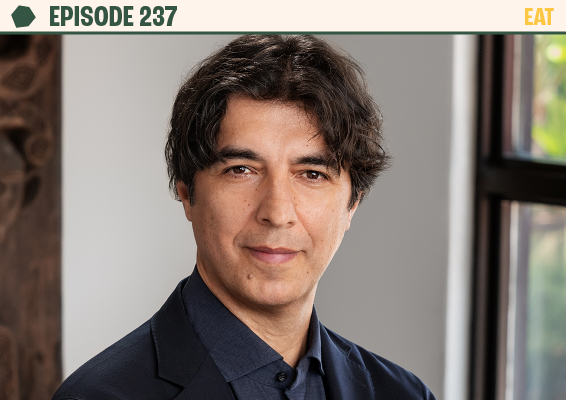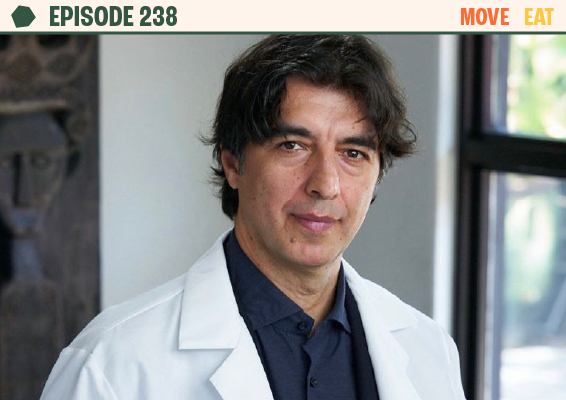In Episode #237, I’m joined by Dr Valter Longo for an exploration of protein, cancer, the fasting-mimicking diet, IGF-1, and mTOR.
“My point is that you don’t need very much protein to get the muscle, and at the same time get the benefits.”
Regular listeners of The Proof will know that protein is frequently featured in episodes. As an area of nutrition where the scientific community is split, I am interested in digging into the specifics of each viewpoint – and most importantly, the evidence behind each one. Highly requested guest, Dr Valter Longo, returns to the show today to share his position on this contentious topic.
Dr Valter Longo is the Edna M. Jones Professor of Gerontology and Biological Sciences and Director of the Longevity Institute at the USC Leonard David School of Gerontology, one of the leading centres for research on aging and age-related disease. Dr Longo is also the Director of the Longevity and Cancer Program at the IFOM Institute of Molecular Oncology in Milan, Italy. His studies focus on the fundamental mechanisms of aging in simple organisms and mice, and on how these mechanisms can be translated to humans. With extensive education and a prominent career, Dr Longo brings an incredibly interesting perspective to today’s conversation.
“There is nothing wrong with having proteins, and of course building muscle. But the amount that you need to get there is much lower than what people think.”
In this episode, we zoom in on terms that have become buzzwords in the protein space, including IGF-1 and mTOR. We discuss protein requirements for different ages, muscle tissue importance, benefits of protein consumption, and potential risks. We also cover the fasting-mimicking diet for both regular folks and as an adjunct cancer treatment.
Specifically, we discuss:
- Intro (0:00)
- Ideal diets for longevity (2:58)
- Important Pathways for aging (9:15)
- IGF1 Elevation (16:24)
- Actue vs Chronic elevation of IGF1 (19:46)
- Danger of Protein Over Consumption (25:11)
- Impact of exercise on IGF1 (32:52)
- Muscle Mass and Longevity (38:35)
- Study on High Protein Later in Life (41:59)
- How to get IGF1 tested (48:03)
- Low IGF1 & Cognitive Decline (49:54)
- Resistance to IGF1 (53:00)
- Mendelian Randomization Studies (54:38)
- Fasting Mimicking Diet (59:21)
- Fasting and Cancer (1:16:03)
- Ketogenic Diet & Cancer (1:27:51)
- Outro (1:32:15)
I appreciate having Dr Longo on the show today and hearing yet another perspective on protein, plus much more interesting research and insights. I hope you found this conversation interesting and informative as part of The Proof’s exploration on protein. If you’re feeling confused or overwhelmed by the amount of information (and partially conflicting stances) The Proof has covered lately, don’t fret – I will be releasing a recap and evaluation of this learning soon. Make sure to follow @theproof and @simonhill on Instagram to stay in the loop, and subscribe on YouTube for the most detailed episode experience.
To connect with Dr Valter Longo, you can find him on Instagram and Facebook. Learn more about Dr Longo’s research on his website, https://www.valterlongo.com/, where you will also be able to view and purchase his book, The Longevity Diet. Make sure to listen to Dr Longo’s previous appearance on The Proof, Episode #106.
The best way to support the show is to use the products and services offered by our sponsors. To check them out, and enjoy great savings, visit theproof.com/friends.
Enjoy, friends.
Simon
More about Valter Longo, PhD
Dr. Valter Longo is the Edna M. Jones Professor of Gerontology and Biological Sciences and Director of the Longevity Institute at the University of Southern California – Leonard Davis School of Gerontology, Los Angeles, one of the leading centers for research on aging and age-related disease. Dr. Longo is also the Director of the Longevity and Cancer Program at the IFOM Institute of Molecular Oncology in Milan, Italy.
Dr. Longo studied biochemistry as an undergraduate at the University of North Texas, and received his PhD in Biochemistry from UCLA, where he worked under calorie restriction guru Roy Walford, MD. He completed his postdoctoral training in neurobiology with longevity pioneer, Caleb Finch, PhD. He also received extensive training in immunology, endocrinology, microbiology, genetics, molecular biology, and pathology.
His studies focus on the fundamental mechanisms of aging in simple organisms and mice and on how these mechanisms can be translated to humans. The Longo laboratory has identified some of the key genetic pathways that regulate aging in simple organisms and has demonstrated that the inactivation of such pathways can reduce the incidence or progression of multiple diseases in mice and humans. His laboratory has also developed both dietary and genetic interventions that protect normal cells while sensitizing cancer cells to chemotherapy— interventions now being tested in many US and European hospitals.
The Longo laboratory recently published key findings on a 5 day periodic dietary intervention called Fasting Mimicking Diet (FMD), and showed in randomized clinical trials that FMD reduces the risk factors and markers associated with aging and diseases. Dr. Longo’s most recent studies focus on the use of FMD interventions to activate stem cell- based regeneration to promote longevity.
Dr. Longo has received numerous awards for his work: the 2010 Nathan Shock Lecture Award from the National Institute on Aging (NIA/NIH), the 2013 Vincent Cristofalo “Rising Star” Award in Aging Research from the American Federation for Aging Research (AFAR), the 2016 Merz Professorship, the 2016 Boehaave Professorship, the 2016 Jubilee Professorship, and the 2016 Glenn Award for research on aging. In 2018 he was named by “Time Magazine” one of the 50 most influential people in health care for his research on fasting-mimicking diets as a way to improve health and prevent disease.
Professor Longo’s core objectives are: to offer treatment and other health services to patients with serious diseases and to those who seek to halt the onset of such diseases; to educate the public—both adults and youth—about how to live a long and healthy life; to sponsor research to develop innovative and creative treatment strategies that are affordable and accessible to all; and to identify ways to prevent specific diseases.
To achieve these goals, Professor Longo donates all profits from his books to research and programs, some named above and all made possible by his Foundations, Fondazione Valter Longo in Milano and Create Cures Foundation in Los Angeles. These books include the best seller “The Longevity Diet” and the 2 Italian books “Alla tavola della longevità” (“At the Table of Longevity”), and “La longevità inizia da bambini” (“Longevity Begins in Childhood”), the latter of which will be published in September.
Supporting studies
- Exercise, Dietary Protein, and Combined Effect on IGF-1 • PMID: 33564731
- IGF-I deficiency, longevity and cancer protection of patients with Laron syndrome • PMID: 28528685
- Low protein intake is associated with a major reduction in IGF-1, cancer, and overall mortality in the 65 and younger but not older population • PMID: 24606898
- Growth Hormone Receptor Deficiency is Associated With a Major Reduction in Pro-aging Signaling, Cancer and Diabetes in Humans • PMID: 21325617
- Growth Hormone Receptor Deficiency is Associated With a Major Reduction in Pro-aging Signaling, Cancer and Diabetes in Humans • PMID: 21325617
- Growth Hormone Receptor Deficiency is Associated With a Major Reduction in Pro-aging Signaling, Cancer and Diabetes in Humans • PMID: 21325617
- Safety and Feasibility of Fasting-Mimicking Diet and Effects on Nutritional Status and Circulating Metabolic and Inflammatory Factors in Cancer Patients Undergoing Active Treatment • PMID: 34439167
- Low protein intake is associated with a major reduction in IGF-1, cancer, and overall mortality in the 65 and younger but not older population • PMID: 24606898
- Association between IGF-1 levels ranges and all-cause mortality: A meta-analysis. Both high and low levels of IGF-1 increase mortality risk, with a specific 120-160 ng/ml range being associated with the lowest mortality • PMID: 35048526
- IGF-1 and cardiometabolic diseases: a Mendelian randomisation study • PMID: 32548700
- Fasting-mimicking diet and markers/risk factors for aging, diabetes, cancer, and cardiovascular disease • PMID: 28202779
- A periodic diet that mimics fasting promotes multi-system regeneration, enhanced cognitive performance and healthspan • PMID: 26094889
- Fasting renders immunotherapy effective against low-immunogenic breast cancer while reducing side effects • PMID: 36001966
- Fasting mimicking diet as an adjunct to neoadjuvant chemotherapy for breast cancer in the multicentre randomized phase 2 DIRECT trial • PMID: 32576828
- Exceptional tumour responses to fasting-mimicking diet combined with standard anticancer therapies: A sub-analysis of the NCT03340935 trial • PMID: 35810555
- Fasting-mimicking diet cycles reduce neuroinflammation to attenuate cognitive decline in Alzheimer’s models • PMID: 36170815
- Valter’s website: https://www.valterlongo.com
- Valter’s google scholar: https://pubmed.ncbi.nlm.nih.gov/?sort=date&term=Longo+VD&cauthor_id=36170815







